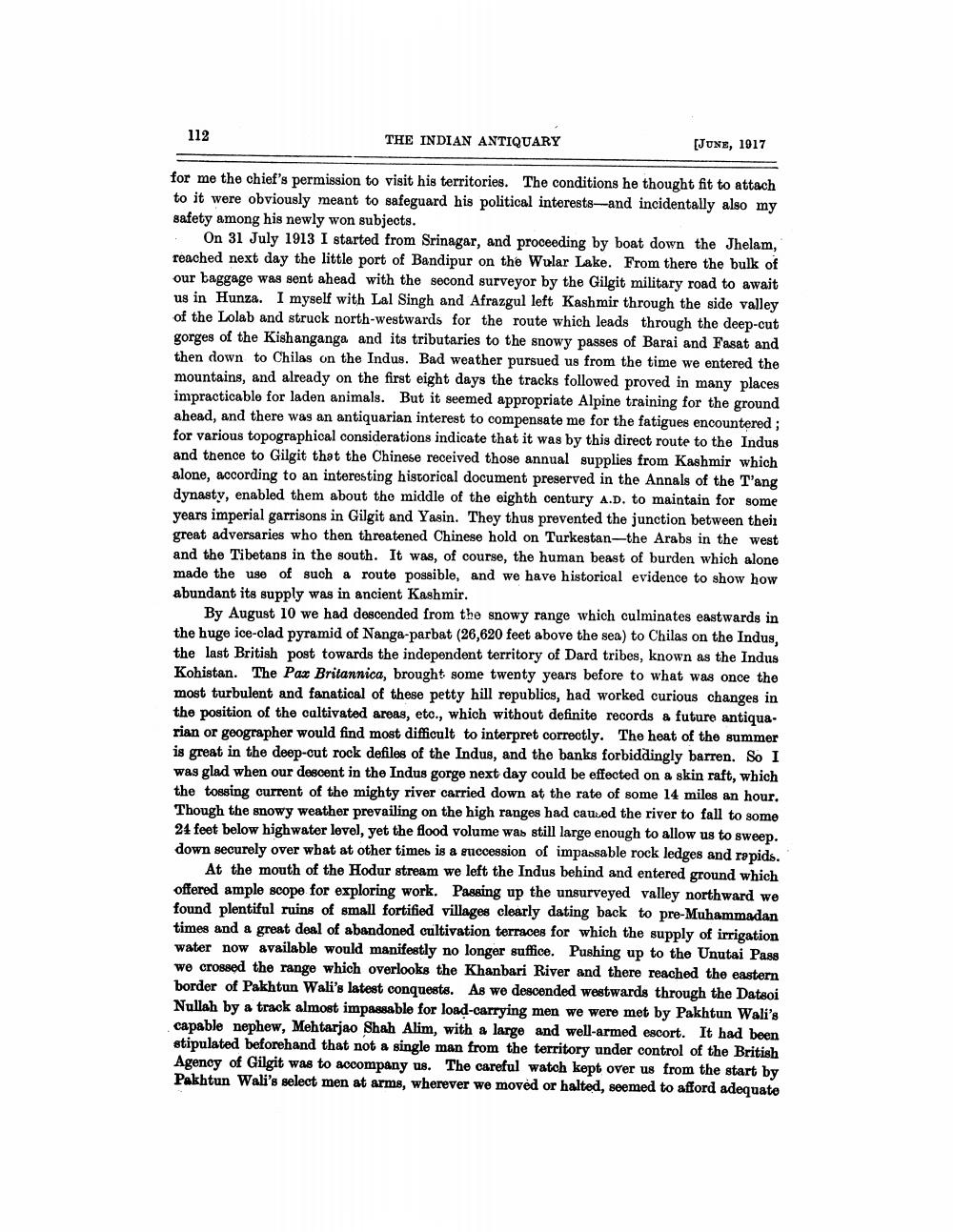________________
112
THE INDIAN ANTIQUARY
[JUNE, 1917
for me the chief's permission to visit his territories. The conditions he thought fit to attach to it were obviously meant to safeguard his political interests and incidentally also my safety among his newly won subjects.
On 31 July 1913 I started from Srinagar, and proceeding by boat down the Jhelam, reached next day the little port of Bandipur on the Wular Lake. From there the bulk of our baggage was sent ahead with the second surveyor by the Gilgit military road to await us in Hunza. I myself with Lal Singh and Afrazgul left Kashmir through the side valley of the Lolab and struck north-westwards for the route which leads through the deep-cut gorges of the Kishanganga and its tributaries to the snowy passes of Barai and Fasat and then down to Chilas on the Indus. Bad weather pursued us from the time we entered the mountains, and already on the first eight days the tracks followed proved in many places impracticable for laden animals. But it seemed appropriate Alpine training for the ground ahead, and there was an antiquarian interest to compensate me for the fatigues encountered ; for various topographical considerations indicate that it was by this direct route to the Indus and thence to Gilgit that the Chinese received those annual supplies from Kashmir which alone, according to an interesting historical document preserved in the Annals of the T'ang dynasty, enabled them about the middle of the eighth century A.D. to maintain for some years imperial garrisons in Gilgit and Yasin. They thus prevented the junction between their great adversaries who then threatened Chinese hold on Turkestan-the Arabs in the west and the Tibetans in the south. It was, of course, the human beast of burden which alone made the use of such a route possible, and we have historical evidence to show how abundant its supply was in ancient Kashmir.
By August 10 we had descended from the snowy range which culminates eastwards in the huge ice-clad pyramid of Nanga-parbat (26,620 feet above the sea) to Chilas on the Indus, the last British post towards the independent territory of Dard tribes, known as the Indus Kohistan. The Pax Britannica, brought some twenty years before to what was once the most turbulent and fanatical of these petty hill republics, had worked curious changes in the position of the caltivated areas, etc., which without definite records a future antiquarian or geographer would find most difficult to interpret correctly. The heat of the summer is great in the deep-cut rock defiles of the Indus, and the banks forbiddingly barren. So I was glad when our descent in the Indus gorge next day could be effected on a skin raft, which the tossing current of the mighty river carried down at the rate of some 14 miles an hour. Though the snowy weather prevailing on the high ranges had caused the river to fall to some 24 feet below highwater level, yet the flood volume was still large enough to allow us to sweep. down securely over what at other times is a succession of impassable rock ledges and repids.
At the mouth of the Hodur stream we left the Indus behind and entered ground which offered ample scope for exploring work. Passing up the unsurveyed valley northward we found plentiful ruins of small fortified villages clearly dating back to pre-Muhammadan times and a great deal of abandoned cultivation terraces for which the supply of irrigation water now available would manifestly no longer suffice. Pushing up to the Unutai Pass we crossed the range which overlooks the Khanbari River and there reached the eastern border of Pakhtun Wali's latest conquests. As we descended westwards through the Datsoi Nullah by a track almost impassable for load carrying men we were met by Pakhtun Wali's capable nephew, Mehtarjao Shah Alim, with a large and well-armed escort. It had been stipulated beforehand that not a single man from the territory under control of the British Agency of Gilgit was to accompany us. The careful watch kept over us from the start by Pakhtun Wali's select men at arms, wherever we moved or halted, seemed to afford adequate




